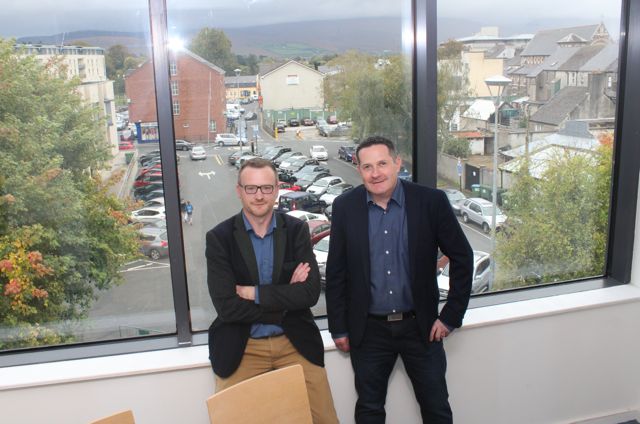
Ken Tobin and Tom O’Leary of HQ Tralee. File Photo
A NEW economic report from Vodafone Ireland has found that HQ Tralee generates over €10 million for the local economy, and had the largest economic impact of all of the hubs assessed across Ireland, having supported the creation of 153 new jobs directly and a further 107 indirectly.
HQTralee & HQListowel, established by Tom O’Leary and Ken Tobin, are digital hubs that are home to 41 businesses with combined net wages of €6.77 million – generating €1.69 million in taxes.
Ken Tobin, Co-owner, HQ Tralee, said; “The fact that we are based in the centre of town means that you have the community aspect, that quality of life. Everything is on your doorstep.”
Continued below…
Richard Sharp, Horizon Controls, HQ Tralee, said; “I’m the chairman of Tralee Rugby Club and we’ve lost a lot of IT skilled individuals who have gone off to Cork or Dublin because they’ve gone to University or they’ve gone to work in larger jobs. The benefit of being able to work in the hub is that we can retain those individuals and they can play their sports with their local towns and communities.”
The hubs assessed include; HQTralee; Enterprise House, Carlow; New Work Junction, Kilkenny; Ludgate, Skibbereen; Creative Spark, Dundalk and The Mill, Drogheda.
The study, which was carried out by economist Jim Power, and commissioned by Vodafone Ireland, was undertaken to assess how smart working – flexible or remote working from home or a hub – can help rural communities thrive in a meaningful way.
A quantitative analysis of job creation, talent migration, economic activity and outputs of the businesses that operate in six of Vodafone and SIRO’s digital hubs provides insight into the potential socio-economic benefits smart working practices could have, if replicated nationally in every county.
Already each of these digital hubs are making significant contributions to the local economies and communities in which they operate.
In terms of financial contribution, the combined economic data collected from each of the six hubs involved in the report reveals that they employ 462 people, host 176 businesses, contribute €27.3 million to the economy and €18.2 million in net wages earned. All of the digital hubs are operating at or close to full capacity and all want to expand their physical space further to satisfy significant growing demand.
According to the report, at a national level, if a digital hub was established in every county around Ireland; the potential to make a very significant economic, social and financial contribution across the country is very real.
Alongside alleviating urban migration and slower regional economic growth, the study suggests that the widespread adoption of smart working would result in a significant reduction in congestion and commute times, ease pressure on housing in cities, provide greater availability of school places and generate more employment of young graduates locally.
The research also paints a picture of how smart working can help rural communities thrive in a meaningful way and provide people with a better quality of life.
Additionally, the study included a qualitative assessment with hub managers/owners, business owners and remote workers who operate from the digital hubs to gain insights into the societal benefits of smart working such as: quality of life, cost of living and community engagement.











